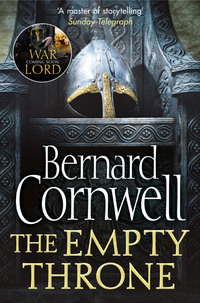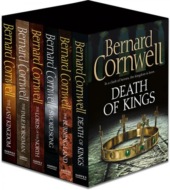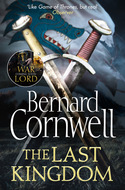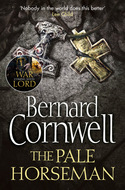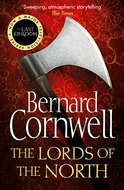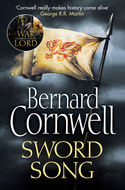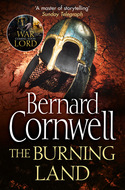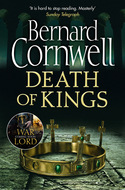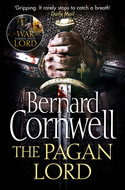Loe raamatut: «The Empty Throne»
THE EMPTY THRONE

BERNARD CORNWELL

Copyright
HarperCollinsPublishers
1 London Bridge Street
London SE1 9GF
First published by HarperCollinsPublishers 2014
Copyright © Bernard Cornwell 2014
Cover layout design © HarperCollinsPublishers Ltd 2016
Cover illustration © Lee Gibbons/Tin Moon – www.leegibbons.co.uk
Map © John Gilkes 2014
Bernard Cornwell asserts the moral right to be identified as the author of this work.
A catalogue record for this book is available from the British Library.
This novel is entirely a work of fiction. The names, characters and incidents portrayed in it while at times based on historical figures, are the work of the author’s imagination.
All rights reserved under International and Pan-American Copyright Conventions. By payment of the required fees, you have been granted the non-exclusive, non-transferable right to access and read the text of this e-book on-screen. No part of this text may be reproduced, transmitted, down-loaded, decompiled, reverse engineered, or stored in or introduced into any information storage and retrieval system, in any form or by any means, whether electronic or mechanical, now known or hereinafter invented, without the express written permission of HarperCollins.
Source ISBN: 9780007504190
Ebook Edition © 2015 ISBN: 9780007504183
Version: 2019-09-27
Dedication
THE EMPTY THRONE
is for Peggy Davis
Contents
Cover
Title Page
Copyright
Dedication
Place names
Map
Prologue
Part One: THE DYING LORD
Chapter One
Chapter Two
Chapter Three
Part Two: THE LADY OF MERCIA
Chapter Four
Chapter Five
Chapter Six
Chapter Seven
Part Three: THE GOD OF WAR
Chapter Eight
Chapter Nine
Chapter Ten
Chapter Eleven
Chapter Twelve
Historical Note
Keep Reading …
About the Author
Also by Bernard Cornwell
About the Publisher
PLACE NAMES
The spelling of place names in Anglo-Saxon England was an uncertain business, with no consistency and no agreement even about the name itself. Thus London was variously rendered as Lundonia, Lundenberg, Lundenne, Lundene, Lundenwic, Lundenceaster and Lundres. Doubtless some readers will prefer other versions of the names listed below, but I have usually employed whichever spelling is cited in either the Oxford Dictionary of English Place-Names or the Cambridge Dictionary of English Place-Names for the years nearest or contained within Alfred’s reign, AD 871–899, but even that solution is not foolproof. Hayling Island, in 956, was written as both Heilincigae and Hæglingaiggæ. Nor have I been consistent myself; preferring the modern form Northumbria to Norðhymbralond to avoid the suggestion that the boundaries of the ancient kingdom coincide with those of the modern county. So this list, like the spellings themselves, is capricious.
| Abergwaun | Fishguard, Pembrokeshire |
| Alencestre | Alcester, Warwickshire |
| Beamfleot | Benfleet, Essex |
| Bebbanburg | Bamburgh Castle, Northumberland |
| Brunanburh | Bromborough, Cheshire |
| Cadum | Caen, Normandy |
| Ceaster | Chester, Cheshire |
| Cirrenceastre | Cirencester, Gloucestershire |
| Cracgelad | Cricklade, Wiltshire |
| Cumbraland | Cumbria |
| Defnascir | Devonshire |
| Eoferwic | York |
| Eveshomme | Evesham, Worcestershire |
| Exanceaster | Exeter, Devon |
| Fagranforda | Fairford, Gloucestershire |
| Fearnhamme | Farnham, Surrey |
| Gleawecestre | Gloucester, Gloucestershire |
| Lundene | London |
| Lundi | Lundy Island, Devon |
| Mærse | River Mersey |
| Neustria | Westernmost province of Frankia, including Normandy |
| Sæfern | River Severn |
| Scireburnan | Sherborne, Dorset |
| Sealtwic | Droitwich, Worcestershire |
| Teotanheale | Tettenhall, West Midlands |
| Thornsæta | Dorset |
| Tyddewi | St Davids, Pembrokeshire |
| Wiltunscir | Wiltshire |
| Wintanceaster | Winchester, Hampshire |
| Wirhealum | The Wirral, Cheshire |

PROLOGUE

My name is Uhtred. I am the son of Uhtred, who was the son of Uhtred, and his father was also called Uhtred. My father wrote his name thus, Uhtred, but I have seen the name written as Utred, Ughtred or even Ootred. Some of those names are on ancient parchments which declare that Uhtred, son of Uhtred and grandson of Uhtred, is the lawful, sole and eternal owner of the lands that are carefully marked by stones and by dykes, by oaks and by ash, by marsh and by sea. That land is in the north of the country we have learned to call Englaland. They are wave-beaten lands beneath a wind-driven sky. It is the land we call Bebbanburg.
I did not see Bebbanburg till I was grown, and the first time we attacked its high walls we failed. My father’s cousin ruled the great fortress then. His father had stolen it from my father. It was a bloodfeud. The church tried to stop the feud, saying the enemy of all Saxon Christians was the pagan Northmen, whether Danish or Norse, but my father swore me to the feud. If I had refused the oath he would have disinherited me, just as he disinherited and disowned my older brother, not because my brother would not pursue the feud, but because he became a Christian priest. I was once named Osbert, but when my elder brother became a priest I was given his name. My name is Uhtred of Bebbanburg.
My father was a pagan, a warlord, and frightening. He often told me he was frightened of his own father, but I cannot believe it because nothing seemed to frighten him. Many folk claim that our country would be called Daneland and we would all be worshipping Thor and Woden if it had not been for my father, and that is true. True and strange because he hated the Christian god, calling him ‘the nailed god’, yet despite his hatred he spent the greatest part of his life fighting against the pagans. The church will not admit that Englaland exists because of my father, claiming that it was made and won by Christian warriors, but the folk of Englaland know the truth. My father should have been called Uhtred of Englaland.
Yet in the year of our Lord 911 there was no Englaland. There was Wessex and Mercia and East Anglia and Northumbria, and as the winter turned to a sullen spring in that year I was on the border of Mercia and Northumbria in thickly wooded country north of the River Mærse. There were thirty-eight of us, all well mounted and all waiting among the winter-bare branches of a high wood. Beneath us was a valley in which a small fast stream flowed south, and where frost lingered in deep-shadowed gullies. The valley was empty, though just moments before some sixty-five riders had followed the stream southwards and then vanished where the valley and its stream turned sharply west. ‘Not long now,’ Rædwald said.
That was just nervousness and I made no answer. I was nervous too, but tried not to show it. Instead I imagined what my father would have done. He would have been hunched in the saddle, glowering and motionless, and so I hunched in my saddle and stared fixedly into the valley. I touched the hilt of my sword.
She was called Raven-Beak. I suppose she had another name before that because she had belonged to Sigurd Thorrson, and he must have given her a name though I never did find out what it was. At first I thought the sword was called Vlfberht because that strange name was inscribed on the blade in big letters. It looked like this:

But Finan, my father’s friend, told me that Vlfberht is the name of the Frankish smith who made her, and that he makes the finest and most expensive blades in all Christendom, and it must be Christendom because Vlfberht puts the crosses in front of and inside his name. I asked Finan how we could find Vlfberht to buy more swords, but Finan says he is a magic smith who works in secret. A blacksmith will leave his furnace for the night and return in the morning to find that Vlfberht has been in the smithy and left a sword forged in the fires of hell and quenched with dragon’s blood. I called her Raven-Beak because Sigurd’s banner had shown a raven. She had been the sword Sigurd carried when he fought me and when my seax had ripped his belly open. I remember that sword-stroke so well, remember the resistance of his fine mail suddenly giving way and the look in his eyes as he realised he was dying and the elation I felt as I dragged the seax sideways to empty his lifeblood. That had happened in the previous year at the battle at Teotanheale which had driven the Danes out of central Mercia, the same battle in which my father had killed Cnut Ranulfson, but in killing Cnut he had been wounded by Cnut’s sword, Ice-Spite.
Raven-Beak was a good sword, I thought her even better than Serpent-Breath, my father’s blade. She was long-bladed, but surprisingly light, and other swords broke against her edge. She was a warrior’s sword, and I carried her that day in the high wood above the frosted valley where the stream ran so fast. I carried Raven-Beak and my seax, Attor. Attor means venom and she was a short-sword, good for the crowded work of a shield wall. She stung, and it was her venom that had killed Sigurd. And I carried my round shield on which was painted the wolf’s head, the emblem of our family. I wore a helmet crested with a wolf’s head, and a coat of Frankish mail above a leather jerkin, and above it all a cloak of bear fur. I am Uhtred Uhtredson, the true lord of Bebbanburg, and I was nervous that day.
I led the war-band. I was just twenty-one years old and some of the men behind me were almost twice my age with many times my experience, but I was the son of Uhtred, a lord, and so I commanded. Most of the men were well back among the trees, only Rædwald and Sihtric were with me. Both were older, and both had been sent to offer me advice or, rather, to keep me from headstrong stupidity. I had known Sihtric for ever, he was one of my father’s trusted men, while Rædwald was a warrior in the service of the Lady Æthelflaed. ‘Maybe they’re not coming,’ he said. He was a steady man, cautious and careful, and I half suspected he hoped the enemy would not appear.
‘They’re coming,’ Sihtric grunted.
And they did come. They came hurrying from the north, a band of horsemen with shields, spears, axes and swords. Norsemen. I leaned forward in the saddle, trying to count the riders who spurred beside the stream. Three crews? At least one hundred men, and Haki Grimmson was among them, or at least his banner of a ship was there.
‘One hundred and twenty,’ Sihtric said.
‘More,’ Rædwald said.
‘One hundred and twenty,’ Sihtric insisted flatly.
One hundred and twenty horsemen pursuing the sixty-five who had ridden through the valley some moments before. One hundred and twenty men following Haki Grimmson’s banner that was supposed to show a red ship on a white sea, though the red dye of the wool had faded to brown and stained the white sea so that it seemed as if the high-prowed ship was bleeding. The standard-bearer was riding behind a big man on a powerful black horse and I assumed that big man was Haki. He was a Norseman who had settled in Ireland, from where he had crossed to Britain and found land north of the River Mærse and thought to make himself rich by raiding southwards into Mercia. He had taken slaves, cattle, and property, he had even assaulted the Roman walls of Ceaster, though that assault had been beaten off easily enough by the Lady Æthelflaed’s garrison. He was, in short, a nuisance, and that was why we were north of the Mærse, concealed among winter-bare trees and watching his war-band pound south on the frost-hardened track beside the stream.
‘We should …’ Rædwald began.
‘Not yet,’ I interrupted him. I touched Raven-Beak, making sure she moved in her scabbard.
‘Not yet,’ Sihtric agreed.
‘Godric!’ I called, and my servant, a twelve-year-old boy named Godric Grindanson, spurred from where my men waited. ‘Spear,’ I said.
‘Lord,’ he said, and handed me the nine-foot-long ash pole with the heavy iron spearhead.
‘You ride behind us,’ I told Godric, ‘well behind us. You have the horn?’
‘Yes, lord.’ He held up the horn to show me. The sound of the horn would summon help from the sixty-five riders if things went wrong, though I doubted they could offer any real help if my small war-band was attacked by Haki’s grim horsemen.
‘If they’ve dismounted,’ Sihtric spoke to the boy, ‘you help drive their horses away.’
‘I should stay close to …’ Godric began, plainly about to plead that he should stay by my side and so join the fight, but he stopped abruptly when Sihtric backhanded him across the face.
‘You help drive the horses away,’ Sihtric snarled.
‘I will,’ the boy said. His lip was bleeding.
Sihtric loosened the sword in his scabbard. As a boy he had been my father’s servant, and doubtless he had wanted to fight alongside the grown men back then, but there was no quicker way for a boy to die than trying to fight a battle-hardened Norseman. ‘Are we ready?’ he prompted me.
‘Let’s go and kill the bastards,’ I said.
Haki’s war-band had turned west and ridden out of sight. They were following the stream that flowed into a tributary of the Mærse some two miles beyond the valley’s sharp westwards turn. There was a small hill where the two streams joined, nothing more than a long grassy mound like the graves the old people placed all across the land, and that was where Haki would die or be defeated, which, in the end, amounted to the same thing.
We spurred down the hill, though I was in no hurry because I did not want Haki’s men to look behind and see us. We reached the stream and turned south. We did not hurry, indeed I slowed down as Sihtric rode ahead to scout. I watched as he dismounted and as he found a place from where he could see westwards. He was crouching and holding up one hand to caution us, and it was some time before he ran back to his horse and waved us on. He grinned at me when we joined him. ‘They stopped a ways down the valley,’ he said, his voice sibilant because a Danish spear had taken his front teeth at the battle at Teotanheale, ‘then unslung their shields.’ They had ridden beneath us with their shields strapped on their backs, but Haki obviously expected trouble where the valley ended and so had taken the time for his men to prepare for a fight. Our shields were already on our arms.
‘They’ll dismount when they reach the valley’s end,’ I said.
‘Then form a shield wall,’ Sihtric said.
‘So there’s no hurry,’ I finished the thought and grinned.
‘They might hurry,’ Rædwald suggested. He was worried that the fight would start without us.
I shook my head. ‘There are sixty-five Saxons waiting for them,’ I told him, ‘and Haki might outnumber them, but he’ll still be cautious.’ The Norseman would have almost twice as many warriors as the waiting Saxons, but those Saxons were on a hill and already formed into a shield wall. Haki would have to dismount his troops a good distance away so he was not attacked while his men formed their own shield wall, and only when they were formed and when the horses were safely led away would he advance, and that advance would be slow. It takes immense courage to fight in the shield wall when you can smell your enemy’s breath and the blades are falling and stabbing. He would advance slowly, confident in his numbers but careful in case the waiting Saxons had laid a trap. Haki could not afford to lose men. He might reckon he could win the fight where the stream joined the larger river, but he would still be cautious.
The Irish Norse were spreading into Britain. Finan, my father’s companion, claimed that the Irish tribesmen were too formidable an enemy, and so the Norse were being pinned to Ireland’s eastern coast. Yet on this side of the sea, the land north of the Mærse and south of the Scottish kingdoms was wild land, untamed, and so their ships crossed the waves to settle in the valleys of Cumbraland. Cumbraland was properly a part of Northumbria, but the Danish king in Eoferwic welcomed the newcomers. The Danes feared the growing power of the Saxons, and the Irish Norse were savage fighters who could help defend Danish-held land. Haki was merely the last to arrive, and he had thought to enrich himself at Mercia’s expense, which is why we had been sent to destroy him. ‘Remember!’ I called to my men. ‘Only one of them is to survive!’
Leave one alive, that had always been my father’s advice. Let one man take the bad news home to frighten the others, though I suspected all Haki’s men were here, which meant the survivor, if there was one, would take the news of the defeat to widows and orphans. The priests tell us to love our enemies, but to show them no mercy, and Haki had earned none. He had raided the lands around Ceaster and the garrison there, sufficient to hold the walls, but not sufficient to hold the walls and send a war-band across the Mærse at the same time, had appealed for help. We were the help, and now we rode westwards beside the stream, which grew wider and shallower, no longer hurrying over rocks. Stunted alders grew thick, their bare branches bent eastwards by the unending wind from the far sea. We passed a burned farmstead, nothing left there now except the blackened stones of a hearth. It had been the southernmost of Haki’s steadings and the first we had attacked. In the two weeks since we had come to Ceaster we had burned a dozen of his settlements, taken scores of his cattle, killed his people and enslaved his children. Now he thought he had us trapped.
My stallion’s motion made the heavy golden cross that hung about my neck beat against my chest. I looked southwards to where the sun was a clouded silver disc in a fading sky and I sent a silent prayer to Woden. I am half a pagan, maybe less than half, but even my father had been known to say a prayer to the Christian god. ‘There are many gods,’ he had told me so often, ‘and you never know which one of them is awake, so pray to them all.’
So I prayed to Woden. I am of your blood, I told him, so protect me, and I was indeed of his blood because our family is descended from Woden. He had come to earth and slept with a human girl, but that was long before our people crossed the sea to take Britain. ‘He didn’t sleep with a girl,’ I could hear my father’s scorn as I rode, ‘he gave her a good humping, and you don’t sleep through that.’ I wondered why the gods no longer came to earth. It would make belief so much easier.
‘Not so fast!’ Sihtric called, and I stopped thinking about gods humping girls to see that three of our younger men had spurred ahead. ‘Fall back,’ Sihtric called, then grinned at me. ‘Not far, lord.’
‘We should scout,’ Rædwald advised.
‘They’ve had long enough,’ I said, ‘keep riding.’
I knew Haki would dismount his men to attack the waiting shield wall. Horses will not charge home into a shield wall, instead they will sheer aside, so Haki’s men would form their own shield wall to attack the Saxons who were waiting on the long low mound. But we would come from their rear, and horses will charge into the back of a shield wall which is never as tight as the front rank. The front rank is a wall of locked shields and bright weapons, the rear rank is where the panic starts.
We turned slightly northwards, clearing the spur of a hill, and there they were. The sun slanted bright from a gap in the clouds to light the Christian banners on the hilltop and glint from the blades waiting there. Sixty-five men, just sixty-five, a tight shield wall of two ranks on the hill crest beneath the cross-blazoned flags, and between them and us was Haki’s shield wall, still forming, and nearest to us and off to our right were his horses under the guard of boys. ‘Rædwald,’ I said, ‘three men to drive the horses off.’
‘Lord,’ he acknowledged.
‘Go with them, Godric!’ I called to my servant, then hefted the heavy ash-shafted spear. The Norsemen had still not seen us. All they knew was that a raiding party of Mercians had penetrated deep into Haki’s territory and the Norsemen had pursued them, thinking to slaughter them, but now they would find they had been lured into a trap. ‘Kill them!’ I shouted and put my spurs back.
Kill them. This is what the poets sing about. At night, in the hall, when the hearth smoke thickens about the beams and the ale-horns are filled and the harpist plucks his strings, the songs of battle are sung. They are the songs of our family, of our people, and it is how we remember the past. We call a poet a scop and scop means someone who shapes things and a poet shapes our past so we remember the glories of our ancestors and how they brought us land and women and cattle and glory. There would be no Norse song of Haki, I thought, because this would be a Saxon song about a Saxon victory.
And we charged. Spear held tight, shield close, and Hearding, my horse, brave beast, was pounding the earth with hard hooves, and to my left and right the horses galloped, the spears held low, horse breath steaming, and the enemy turned, astonished, and the men at the rear of their shield wall did not know what to do. Some ran towards their horses and others tried to make a new shield wall to face us and I saw the gaps opening and knew they were dead men already. Beyond them, on the mound, the waiting Saxon warriors were fetching their own horses, but we would start the slaughter.
And we did.
I fixed my eyes on a tall, black-bearded man wearing fine mail and a helmet crested with eagle feathers. He was shouting, presumably to call men to lock their shields with his own shield that was painted with a spread eagle, but he saw my gaze, knew his fate and braced himself with his eagle-shield raised and his sword drawn back, and I knew he would strike at Hearding, hoping to blind my horse or shatter his teeth. Always fight the horse, not the rider. Wound or kill the horse and the rider becomes a victim, and the shield wall was breaking, scattering in panic, and I heard the shouts as men tried to rally the fugitives and I leaned into my spear, aiming her, then touched Hearding with my left knee and he swerved as the black-bearded man swung. His sword cut across Hearding’s chest, a savage enough cut that drew blood, but it was not a killing blow, not a crippling cut, and my spear went through his shield, splintering the willow boards and thrusting on to break his mail. I felt her blade shatter his breast-bone and I let the ash shaft go and drew Raven-Beak and turned Hearding back to drive Raven-Beak’s blade into another man’s spine. The blade, made by a sorcerer, broke through mail as if it was tree bark. Hearding crashed between two men, spilling them both to the ground and we turned again, and the whole field was a chaos of panicked men among whom the riders spurred to kill, and more riders came from the mound, our whole force killing and shouting, and above us the banners waved. ‘Merewalh!’ a high voice called sharply. ‘Stop the horses.’
A handful of Norsemen had reached their horses, but Merewalh, a hard warrior, led men to kill them. Haki still lived, surrounded now by thirty or forty of his men, who had formed a shield barrier about their lord, and those men could only watch as their comrades were cut down. But some of our men were down too. I could see three riderless horses and one dying horse, its hooves beating as it lay in a mess of blood. I turned towards it and cut down at a man who had just struggled to his feet. He was dazed and I dazed him more with a slash across his helmet and he went down again, and a man bellowed from my left, swinging an axe two-handed, and Hearding twisted, lithe as a cat, and the axe-blade glanced from my shield, we turned again and Raven-Beak sliced once and I saw the blood bright. I was shouting, exhilarated, screaming my name so that the dead would know who had sent them to their doom.
I spurred on, sword low, looking for the white horse called Gast and saw him fifty or sixty paces away. His rider, sword in hand, was spurring towards Haki’s shield-guarded remnant, but three other horses swerved into Gast’s path to check his rider. Then I had to forget Gast because a man swung a sword at me with an overhead slash. The man had lost his helmet, and half his face was smothered with blood. I could see more blood seeping at his waist, but he was grim-faced, hard-eyed, battle-forged, and he bellowed death at me as he swung, and I met the sword with Raven-Beak and she split his blade in two so that the upper half speared into my saddle’s pommel and stayed there. The lower half tore a gash in my right boot and I felt the blood welling as the man stumbled. I thrust Raven-Beak down to shatter his skull and rode on to see Gerbruht had dismounted and was thrashing an axe at a dead or nearly dead man. Gerbruht had already disembowelled his victim, now he seemed intent on separating flesh from bone and was screaming in rage as he slashed the heavy blade down to spatter gobbets of flesh, blood, shattered mail and splintered bone onto the grass.
‘What are you doing?’ I shouted at him.
‘He called me fat!’ Gerbruht, a Frisian who had joined our war-band during the winter, shouted back. ‘The bastard called me fat!’
‘You are fat,’ I pointed out and that was true. Gerbruht had a belly like a pig and legs like tree trunks and three chins under his beard, but he was also hugely strong. A fearful man to face in a fight and a good friend to have beside you in the shield wall.
‘He won’t call me fat again,’ Gerbruht snarled and drove the axe into the dead man’s skull, splitting the face and opening up the brain. ‘Skinny bastard.’
‘You eat too much,’ I said.
‘I’m always hungry, that’s why.’
I turned my horse to see that the fight was over. Haki and his shield companions still lived, but they were outnumbered and surrounded. Our Saxons were dismounting to kill the wounded and strip the corpses of mail, weapons, silver and gold. Like all the Northmen, these warriors liked arm rings to boast of their prowess in battle, and we piled the rings, along with brooches, scabbard decorations and neck chains onto a sword-ripped, blood-soaked cloak. I took one arm ring from the corpse of the black-bearded man. It was a chunk of gold, incised with the angular letters the Norsemen use, and I slipped it over my left wrist to join my other rings. Sihtric was grinning. He had a prisoner, a scared boy who was almost a man. ‘Our one survivor, lord,’ Sihtric said.
‘He’ll do,’ I said. ‘Cut off his sword hand and give him a horse. Then he can go.’
Haki watched us. I rode close to the remaining Norsemen and stopped to stare at him. He was a squat, scar-faced man with a brown beard. His helmet had come off in the fight and his straggly hair was dark with blood. His ears stood out like jug handles. He stared back, defiant. Thor’s hammer, shaped in gold, hung at his mail-clad chest. I counted twenty-seven men around him. They made a tight circle, shields outwards. ‘Become a Christian,’ I called to him in Danish, ‘and you might live.’
He understood me, though I doubted Danish was his language. He laughed at my suggestion, then spat. I was not even sure I had told him the truth, though many defeated enemies were spared if they agreed to conversion and baptism. The decision was not mine to make, it belonged to the rider mounted on the tall white horse called Gast. I turned towards the ring of horsemen who now surrounded Haki and his survivors, and the rider of the white horse looked past me. ‘Take Haki alive, kill the rest.’
